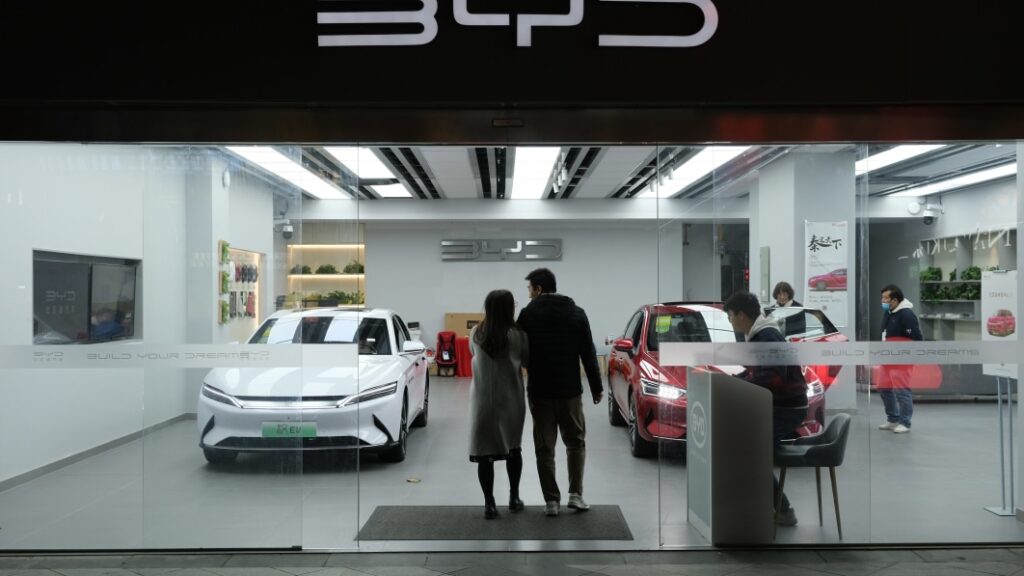China doesn't need to sell a single electric car in the U.S. to dominate the market

The success of Chinese EV-makers in 2022 has the industry wondering if its next move will really be the U.S..
Robert Way/iStock Editorial/Getty Images Plus
Chinese carmakers have a massive, domestic EV battery supply chain to lean on.
That’s a huge advantage for those companies in the global market.
But their entrance in the U.S. might not be a shoo-in.
The Chinese electric vehicle market is huge and growing — and that success has many wondering what’s next.
About 27% of new vehicle sales in China last year were electrified (either pure EVs or hybrids), says advisory firm Automobility. And given the number of Chinese buyers, those sales made up about two-thirds of the global EV market.
Despite COVID lockdowns, other headwinds impacting consumer sentiment and the economy, and government EV subsidies phasing out, it’s an exciting time for the Chinese auto industry, bolstered by the country’s long-standing and inimitable EV supply chain.
EV companies like Geely, Xpeng, Li Auto, NIO, and more are gaining traction. Their market share in China rose 17% in 2022, while that of non-Chinese automakers dropped 11%. (Firm BYD alone sold nearly 1.8 million battery electric vehicles and plug-in hybrids in China last year — surpassing Tesla’s 1.3 million worldwide.)
Even if others catch up, China will continue to dominate global EV sales this year, according to GlobalData.
So naturally, industry watchers think a move into the US could be imminent.
“What happens in China will not stay in China,” said Bill Russo, CEO of advisory firm Automobility. “If you have that kind of supply chain, that kind of position on the chess board, then why wouldn’t you take that internationally?”
Chinese EV-makers have advantages — but it’s complicated
Chinese automakers would have a number of advantages in the US, chief among them the relatively low cost of their cars compared to American makes.
“There’s a difference between people’s allegiances to their country and what they buy at the store,” Russo said. “One thing that’s absolutely universal is people buy affordability.”
And after all, Japanese, Korean, and European automakers have had plenty of success in the US: Toyota was the country’s top-selling brand in 2021.
On the other hand, the Inflation Reduction Act’s EV tax credit rules mean that vehicles manufactured in China won’t qualify for the US-final assembly requirements that could earn electric car-buyers a $7,500 credit.
Political sentiment and having to battle entrenched companies in a mature market are also barriers.
“By far the biggest obstacle is politics,” Deutsche Bank analyst Edison Yu told Insider. “You have a lot of anti-China sentiment.”
“If they can somehow overcome that, I think a lot of Chinese auto companies would love to get a crack at the market.”
BYD, for example, has a focus on global expansion, but those sentiments and recent developments with Tesla have put those plans on pause. “They’ve very hesitant to expand because of this.”
China already has plenty of booming business
Even if it doesn’t dominate the U.S. car-buying market, China can play a starring role by leaning on its control of so much of the global EV battery supply chain, including raw materials, processing, cell manufacturing, and more.
China controlled about 75% of all battery cell manufacturing capacity and 90% of battery anode and electrolyte production in 2022, according to BloombergNEF. As it stands, U.S. automakers like GM and Tesla have been reliant on companies in China, like giant CATL, for their battery needs.
Even as the U.S. shores up more minerals extraction here and the U.S. battery-making industry grows, much of these materials are still sent to China for processing, and China is still expected to control a majority of the production capacity in 2027, per BloombergNEF.
“The automotive industry, in the early part of the 21st century, has been dominated by foreign brands,” Russo said. That has shifted, as “Electrification leveled the playing field.”



